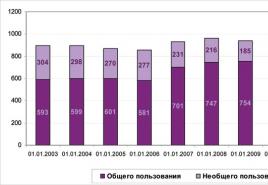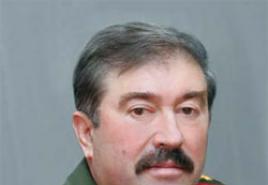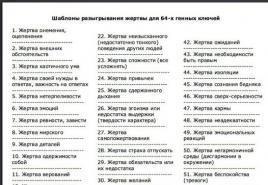The meaning of the word de in Dahl's dictionary. "My life is a casino": Zakharova told "KP" what the mysterious fragment of her new poems means What does the particle de mean in Russian
Dictionary of Russian synonyms:
De - they say, they say. "There was a petition from the sheep in the order: that the wolves, they say, completely flay the skin from us." Wing. "The old man liked to show himself on occasion: they say, and we live in the world." Turg.
Big encyclopedic dictionary:
DE - DES. ... ... (lat. de...; French. de...., des....), a prefix meaning: 1) the absence, cancellation, elimination of something (eg, demobilization, degassing, disorientation). 2) Downward movement, decrease (for example, devaluation).
Explanatory dictionary of the Russian language by D. N. Ushakov:
DE, particle (vernacular). Uptr. when transferring someone else's speech in meaning. they say, they say. - You are with the master, he says, swindlers. ... ... We, he says, have seen such skiers and scoundrels. Gogol.
New dictionary of the Russian language edited by T.F. Efremova:
De
particle raz. - reduction.
Uptr. when transmitting someone else's speech; matches the meaning of sl. : they say, they say, they say, they say.
Dahl's Explanatory Dictionary of the Living Great Russian Language:
DE, a particle meaning the introductory words of another, the transfer of other people's words; they say, discat, they say, ml. He says, “I’m not going,” de, at least what do you want to do. He said he was there and there. The table could be put, but the chairs were cramped. The pig recognized his pig. de lie, but I de misrepresent de de. This particle clearly and briefly expresses the false speech, and in vain they neglect it.
de a particle meaning the introductory words of another, the transfer of other people's words; they say, discat, they say, ml. He says, “I’m not going,” de, at least what do you want to do. He said he was there and there. The table could be put, but the chairs were cramped. The pig recognized his pig. de lie, but I de misrepresent de de. This particle clearly and briefly expresses the false speech, and in vain they neglect it.
Dal V.I. ... Dahl's Explanatory Dictionary, 1863-1866 .
- Meaning of the word clear in Dahl's dictionary - (yatny? see yati), light, bright; shining, shiny; white, clean, glossy; against. dark, cloudy, cloudy. Clear sun, ...
- ask - ask about what, who, what, from whom, to get rid of the thief. , tamb. ask psk. check the app. ask, give or suggest a question, ...
- like (03) is old. false intelligence, sophistry, false judgment. Not by false words, but by God, sthr. To verbalize, speak, converse; indulge in words, empty, ...
- blue - azure, dark blue, denser color, darker than blue. In the south, on a clear, starry night, the sky does not seem blue, but blue, as sometimes ...
The following meanings of words:
- What debit -? vyat. , lower. sit over something, pore, study diligently, sit for a long time, stubbornly; b. h. they say debit with whom. Debova? ...
- debit - bargaining. , lat. owe (me) or have, parish, left or incoming page of the merchant book; against. credit, I pay, expense, right, ...
- plump - hardened, thick, dense, healthy, smooth, obese. Dean cattle. Debelya wall. arkhan. capital, log inside the house, not a partition. Blank letter, ...
- landing stage - husband. , French the place of arrival and departure of trains on the railways; pier.
Previous interpretations of the word:
- What does two-syllable (02) - cf. punctuation mark (:) followed by an addition or explanation of the previous one. Two (two) point, indicated by two points. Two-termed, making up two-thirds of what. ...
a particle meaning the introductory words of another, the transfer of other people's words; they say, discat, they say, ml. He says, “I’m not going,” de, at least what do you want to do. He said he was there and there. The table could be put, but the chairs were cramped. The pig recognized his pig. de lie, but I de misrepresent de de. This particle clearly and briefly expresses the false speech, and in vain they neglect it.
Dahl. Dahl's Dictionary. 2012
See also the interpretations, synonyms, meanings of the word and what is DE in Russian in dictionaries, encyclopedias and reference books:
- DE in the Illustrated Encyclopedia of Weapons:
LUX - American six-shot revolver 45 ... - DE in the Modern Encyclopedic Dictionary:
- DE
(DES ...) (Latin de ... French de ..., des ...), a prefix meaning: 1) absence, cancellation, elimination of something (for example, demobilization, degassing, disorientation) 2) movement down, … - DE ... in the Encyclopedic Dictionary:
before the vowel DES ... Prefix in foreign words, meaning: 1) destruction, removal, for example: deratization, deportation, disinsection; 2) opposite action, eg: unblock, ... - DE in the Encyclopedic Dictionary:
, particle (simple). The same as they say. .., prefix. Forms verbs and nouns with meaning. absence or opposite, ex. two-ideologization, ... - DE
HAAZA - VAN ALPHENA EFFECT, oscillating dependence of the magnetic susceptibility of metals and semimetals on the strength of the applied magnet. fields N. Observed ... - DE in the Big Russian Encyclopedic Dictionary:
FRIES (De Vries) Hugo (1848-1935), netherl. botanist, one of the founders of the doctrine of variability and evolution, in. ch.-c. RAS (1924), in. ... - DE in the Big Russian Encyclopedic Dictionary:
FRIES, Frieze (de Vries) Martin Geritson (17th century), Dutch. navigator. In 1643-44 he explored the east. the coast of the Honshu Islands and ... - DE in the Big Russian Encyclopedic Dictionary:
FOREST L., see Forest L. ... - DE in the Big Russian Encyclopedic Dictionary:
FILIPPO (De Filippo) (real fam. Passarelli, Passarelli) Eduardo (1900-84), ital. playwright, director, actor. Creativity is associated with neo-realism. In the plays, the social ... - DE in the Big Russian Encyclopedic Dictionary:
THAM (De Tham) (Hoang Hoa Tham, Hoang Noa Tham) (c. 1857-1913), head of the armament. speeches against the French. colonialists in the North. Vietnam ... - DE in the Big Russian Encyclopedic Dictionary:
TU Zh., See Tu ... - DE in the Big Russian Encyclopedic Dictionary.
- DE in the Big Russian Encyclopedic Dictionary:
SANTIS (De Santis) Giuseppe (1917-97), Italian. film director. One of the founders of neorealism. Participant Dv. Resist. F .: "Tragic Hunt" (1947), "There is no peace ... - DE in the Big Russian Encyclopedic Dictionary:
SANCTIS (De Sanctis) Francesco (1817-1883), Italian. literary historian, critic and societies. activist, one of the ideologists of the Risorgimento; adjoined ... - DE in the Big Russian Encyclopedic Dictionary:
SABATA (De Sabata) Victor (1892-1967), Italian. conductor, composer. In 1927-57 he was the conductor of La Scala Theater. He spoke in pl. countries. One of … - DE in the Big Russian Encyclopedic Dictionary:
Quincey, De Quincey Thomas (1785-1859), eng. writer. Autobiogr. pov. "Confessions of an Englishman, an Opium Smoker" (1822), describing the sensations of a visionary. ... - DE in the Big Russian Encyclopedic Dictionary:
KRIFE, De Krui (de Kruif) Paul (1890-1971), Amer. writer. One of the founders of scientific and fictional literature (book "Hunters for microbes", 1926; ... - DE in the Big Russian Encyclopedic Dictionary:
SH. GOLL, see S. Gaul ... - DE in the Big Russian Encyclopedic Dictionary:
ЃASPERI (De Gasperi) Alchide (1881-1954), Italian leader. Christ-Democr. parties (from 1944). De G.'s activities mean. provided the party ... - DE in the Big Russian Encyclopedic Dictionary:
BROIL L., see L. Broglie ... - DE in the Big Russian Encyclopedic Dictionary:
BARI G.A., see Bari ... - -YES in the Dictionary of the Russian language Lopatin:
- -YES in the Spelling Dictionary:
-de, particle - with the preceding word is written with a hyphen: `he-de, ... - DE in the Explanatory Dictionary of the Russian Language by Ushakov:
particle (vernacular). Uptr. when transferring someone else's speech in meaning. they say, they say. - You de and the master, he says, are swindlers ... We de, he says, such ... - DE- in Medical terms:
(des-, de-; lat. de-) prefix meaning: 1) termination, removal, elimination, getting rid of something, separation; denial or change of the concept expressed by subsequent ... - DE ... in the Big Encyclopedic Dictionary:
DES ... (lat. De ...; French. De ..., des ...), a prefix meaning: 1) absence, cancellation, elimination of something (for example, demobilization, degassing, disorientation). 2) Downward movement, ... - DE ... in the Great Soviet Encyclopedia, TSB:
(lat. de ...), a prefix meaning: 1) separation, removal, destruction, cancellation (for example, demobilization); 2) downward movement, decrease (for example, degradation, ... - DE in the Big Russian Encyclopedic Dictionary:
RUA (De Roy) Hendrick (Latinized - Regius, Regius) (1598-1679), Dutch. philosopher, physiologist and teacher. Founder of the direction in ... - DE in the Big Russian Encyclopedic Dictionary:
RADA (De Rada) Jerome (1814-1903), alb. poet. The initiator of the nat. romanticism. The poems "Songs of Milosao" (1836), "Songs of Seraphina Topia" (1843), "Unhappy Skanderbeg" ... - DE in the Big Russian Encyclopedic Dictionary:
N'IRO (De Niro) Robert (b. 1943), Amer. actor. Filmed in films: "Taxi Driver", "Twentieth Century", "New York, New York", "Deer Hunter", "Once ... - DE in the Big Russian Encyclopedic Dictionary:
MILLE Cecile Blount (1881-1959), Amer. film director. F .: "Carmen" (1915), "King of Kings" (1927), "Samson and Delilah" (1949), "Ten Commandments" (1923 and ... - DE in the Big Russian Encyclopedic Dictionary:
MILL (De Mille) Agnes (1909-93), Amer. ballet dancer, choreographer. She worked in "Ballee Rambert" (Great Britain), "Ballee Tietre" (New York), etc. Used ... - DE in the Big Russian Encyclopedic Dictionary:
LONE L., see Lone ... - DE in the Big Russian Encyclopedic Dictionary:
LEON (De Leon) Daniel (1852-1914), leader and ideologist of the Socialist. Workers' Party of the USA (founded in 1876). One of the founders of the Industrial ... - DE in the Big Russian Encyclopedic Dictionary:
ЌUNING (De Kooning) Willem (1904-97), Amer. painter. One of the leading masters of abstract expressionism (along with A. Gorky, J. Pollock, M. ... - DE in the Big Russian Encyclopedic Dictionary:
COSTER (De Coster) Charles (1827-79), belg. writer (in French). Sat. "Flemish Legends" (1858) on plots from the Middle-century. legends filled with Renaissance ... - DE in the Big Russian Encyclopedic Dictionary:
ЌIRIKO (De Chirico) Giorgio (1888-1978), Italian. painter. Head of the "metaphysical school" in painting. In the mountains. landscapes conveyed a feeling of anxious stiffness ... - DE in the Big Russian Encyclopedic Dictionary:
DUV (De Duve) Christian René (b.1917), belg. biochemist. Discovered subcellular structures - lysosomes. Nob. pr. (1974, jointly with J. ... - DE in the Big Russian Encyclopedic Dictionary:
ЃЕЕР (De Geer) Louis (1818-96), in 1858-70 min. justice of Sweden (author of the draft of the non-divine parliament, adopted in 1866), in 1876-1880 ... - DE in the Big Russian Encyclopedic Dictionary:
VALERA (De Valera) Eamon (1882-1975), President of Ireland in 1959-73, head of the Prospect Island in 1932-48, 1951-54, 1957-59. One of the hands. Irl. uprisings ... - DE in the Big Russian Encyclopedic Dictionary:
AḾCHIS (De Amicis) Edmondo (1846-1908), ital. writer. Pov. for children "Heart" (1886), collection of works. the short stories Between School and Home (1892); ... - DE ... in the Big Russian Encyclopedic Dictionary:
DES ... (lat. De ...; French. De ..., des ...), a prefix meaning: absence, cancellation, elimination of something (for example, demobilization, degassing, disorientation). Downward movement, downward movement (eg ... - DE in the Dictionary for solving and compiling scanwords:
Guy ... ... - DE ... in the New Dictionary of Foreign Words:
(lat. de ...) a prefix denoting: 1) separation, deletion, cancellation, eg. : degassing, demobilization; 2) downward movement, decrease, ex. : ... - DE ... in the Dictionary of Foreign Expressions:
[lat. de ...] prefix denoting: 1. separation, removal, cancellation, eg: degassing, demobilization; 2. downward movement, decrease, eg: ... - -YES in Abramov's Dictionary of Synonyms:
they say, they say. "There was a petition from the sheep in the order: that the wolves, they say, completely flay the skin from us." Wing. "The old man loved on occasion ... - DE in the dictionary of Russian Synonyms:
they say ...
The particles do not have lexical meanings (and this is different from the significant parts of speech) and do not express grammatical relations between words and sentences (and this is different from the service parts of speech).
Particles are:
Amplifying (even, then, and, no, after all, and others.)
Restrictive (only, only, etc.)
Pointers (here, there, this)
Interrogative (whether, really, really, really, a)
Exclamation points (what a, like, etc.)
Negative (not, not at all, far from, not at all)
Form-forming particles that serve to form word forms and new words occupy an intermediate position between service words and prefixes and suffixes:
1) particles would, let, let it be, yes, -ka, it was, used to express moods or shades of moods in verbs;
2) undefined particles: something, something, something;
3) negative particle "not" serves not only to express negation, but also to form words with the opposite meaning. In this case, it acts as a prefix:
friend - foe, cheerful - unhappy, clever - unwise.
Separate Particle Spelling
1) Particles whether (b), same (f), whether (e) are written separately:
i would have read it, if it were, here, which one, however, however, hardly, hardly.
The rule does not apply to cases where the specified particles are part of the word: so that, also, too, really, or and etc.
2) Particles after all, there, here, even, they say are written separately:
well, over there, like that, even he; brought, they say.
Hyphenated Particles
1) Particles are written with a hyphen -de, -ka, some- (coy-), (-kas - dial.), -something, -s, -tka, -tco, -that:
you-de, she-de, n-ka, nat-ka, look, some, some-something, someone, some, from somewhere, yes-s, well-tka, look- maybe, somewhere, sometime, something.
Particle -de (colloquial) is used in the transmission of someone else's speech, as well as in the meaning of the verb says (say) and in the meaning of the particles "say", "they say":
And if I see that the penalty is small for him, I will immediately hang all the judges around the table.
My compatriot turned to the commander at a halt: so and so - let me leave, they say, a dear case, they say, since a local resident is within easy reach.
2) Particle say (colloquial) was formed by the merger of two words: de and say.
3) Particle -from (made from the word sir) gives a shade of servility, servility:
Chatsky. Lured by honors and nobility?
Molchalin. No, sir, everyone has their own talent ...
Chatsky. You?
Molchalin. Two-s: moderation and accuracy.
If a between the particle ko- (koi-) and the pronoun there is a preposition, then the whole combination is written apart:
from someone, on something, someone from someone, something from someone.
4) Particle -so ("nevertheless", "nevertheless", "nevertheless", "indeed", "in the end") is written with a hyphen:
after the verbs - persuaded, did appear;
after adverbs - surely, for a long time, again, again;
after the particles - after all, pretty much, really, downright.
In other cases, the particle is still written separately:
The secretary, although he felt his weak discontent, nevertheless was glad to have such old women in the district's assets.
But although the temptation was great, I still managed to overcome myself.
5) Particle something is attached with a hyphen to pronouns and adverbs both to express uncertainty and to give an emotional coloring to the statement:
And why did your heart go bad?
Note 1... Separately, a combination is written like that ("namely") before listing homogeneous members:
In mixed forests, there are a variety of trees, such as: birch, aspen, cedar, pine.
Note 2... If the particle "-that" is inside a complex word, written with a hyphen, then the hyphen is placed before the particle, and after it is omitted:
Tie up crosswise (compare: crosswise);
Exactly exactly, but that's not the point (compare: exactly).
Note 3... If a particle that is written with a hyphen is after another particle, then the hyphen is not written:
all the same, somewhere else; with whom, they say, de it does not happen (compare: after all, with whom, they say, it doesn’t happen).
An exception: before the particle -with a hyphen is saved: Will you have a bite, sir?
Particles "not" and "neither" - in the next post.







